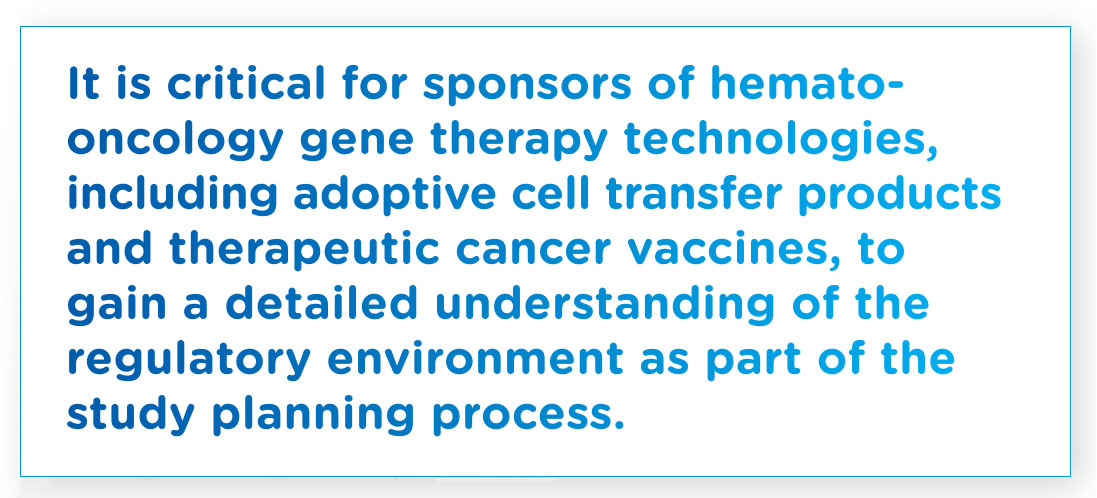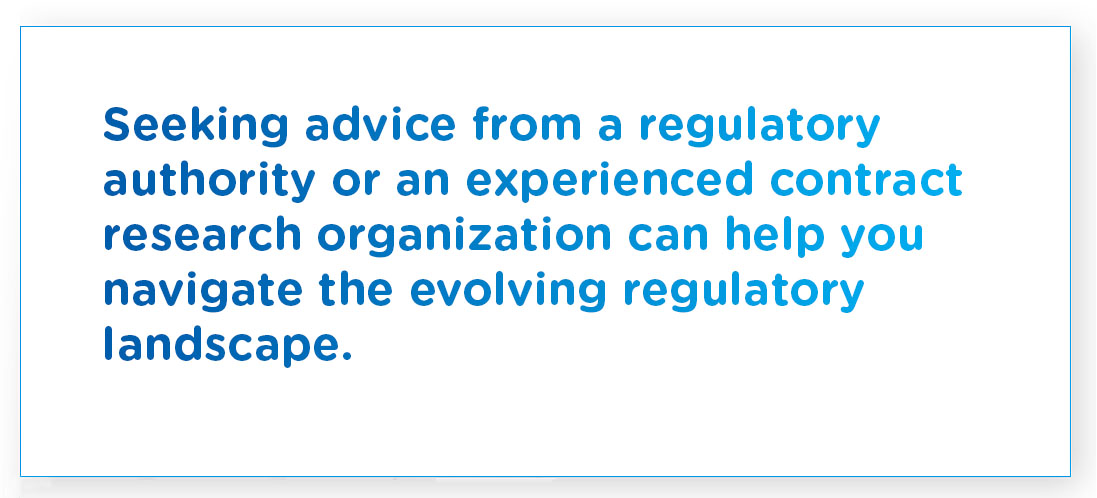Over the past few years, there has been a dramatic increase in the use of genetically modified cells for cancer immunotherapy, including chimeric antigen receptor (CAR)-T cells, recombinant T-cell receptor T cells and genetically modified CD34+ cells for the treatment of hematological malignancies. Clinical trials of immuno-gene therapeutics are becoming increasingly common, and regulatory guidelines are evolving to keep pace with advances in technology. As a result, it is critical for sponsors of hemato-oncology gene therapy technologies, including adoptive cell transfer products and therapeutic cancer vaccines, to gain a detailed understanding of the regulatory environment as part of the study planning process.

FDA Guidance
The U.S. Food and Drug Administration published its first guidance on gene therapy in 1998.[1] Since then, the FDA has published numerous other guidance documents, including:
- Clinical Considerations for Therapeutic Cancer Vaccines (October 2011)[2]
This guidance provides direction on early- and late-phase studies, as well as general considerations regarding the conduct of these studies. - Preclinical Assessment of Investigational Cellular and Gene Therapy Products (November 2013)[3]
This guidance provides recommendations on the substance and scope of preclinical information needed to support clinical trials for investigational cellular therapies, gene therapies and therapeutic vaccines. - Considerations for the Design of Early-Phase Clinical Trials of Cellular and Gene Therapy Products (June 2015)[4]
This guidance provides the FDA’s current recommendations regarding clinical trials in which the primary objectives are initial assessments of safety, tolerability, or feasibility of administration of investigational cellular therapy and gene therapy products. - Recommendations for Microbial Vectors Used for Gene Therapy (September 2016)[5]
This guidance offers recommendations concerning IND submissions for microbial vectors used for gene therapy in early-phase clinical trials. It supplements the FDA’s Guidance for FDA Reviewers and Sponsors: Content and Review of Chemistry, Manufacturing, and Control (CMC) Information for Human Gene Therapy Investigational New Drug Applications (INDs). - Expedited Programs for Regenerative Medicine Therapies for Serious Conditions (November 2017)[6]
This document provides recommendations on the expedited development and review of regenerative medicine therapies for serious or life-threatening diseases or conditions. It also provides information about the provisions in the 21st Century Cures Act regarding the use of the accelerated approval pathway for therapies that have been granted designation as a regenerative medicine advanced therapy (RMAT). - Evaluation of Devices Used with Regenerative Medicine Advanced Therapies (November 2017)[7]
This draft guidance provides the FDA’s thinking regarding evaluation of devices used in the recovery, isolation, or delivery of RMATs. - Regulatory Considerations for Human Cells, Tissues, and Cellular and Tissue-Based Products: Minimal Manipulation and Homologous Use (Updated: December 2017)[8]
This guidance is intended to clarify the definitions of minimal manipulation and homologous use and to facilitate understanding of how regulatory criteria apply to human cells, tissues, and cellular and tissue-based products.
EMA Guidance on Anti-Cancer Medicinal Products
The latest guidance from the European Medicines Agency on anti-cancer medicinal products provides the following guidelines on immuno-modulating products, including vaccines:[9]
- Non-clinical in vitro and in vivo proof-of-concept studies are needed to justify the planned starting dose and schedule in phase I studies.
- Rationale for the starting dose may be supported by using the “Minimal Anticipated Biological Effect Level” (MABEL) approach, or by non-clinical and clinical data from related compounds.
- Information on the differential expression of the target antigen in human tumor and healthy tissues should be provided.
- In cases where no relevant and predictive animal model is available, in vitro studies with human cells (e.g., in vitro T-cell priming assays) might be suitable.
- The aim of early clinical trials is to determine safety, as well as the dose and schedule that induced a desired immune response.
- Dose-finding studies are generally required to establish the recommended phase II dose.
- Monitoring the immune response (i.e., the induction of antigen-specific T cells or the presence of a humoral response) is of interest for determining appropriate dose and schedule.
EMA Guidelines on Genetically Modified Cells
More recently, due to the availability of improved genome editing technologies that allow for more precise gene modifications, the EMA published a concept paper on the revision of the Guideline on quality, non-clinical, and clinical aspects of medicinal products containing genetically modified cells, which came into effect in 2012.[10] This concept paper proposes a multidisciplinary revision of the current guidelines to reflect current technology and experience, as well as to provide specific guidance for the development of CAR-T cells and related products. It is anticipated that a draft revised guideline will be available in 2018.
Sponsors should keep in mind that the EU comprises many countries, and the regulatory environment in certain countries may require additional procedures outside of standard regulatory and ethical review. For example, in some EU member states, CAR-T cells are classified as genetically modified organisms and may require an environmental risk assessment for clinical trial approval.[11] Certain EU member states may also require sponsors to notify other government bodies when a clinical trial of an immuno-oncology agent is being conducted.
Overcoming Regulatory Hurdles
Immuno-gene therapeutics are still in their infancy, and their mode of action and manufacturing may require regulatory agencies to revisit existing guidelines to reflect the rapidly evolving science that is driving discovery. Regulatory and scientific guidance documents are a valuable source of insight, but seeking advice from a regulatory authority or an experienced contract research organization can help sponsor navigate the evolving regulatory landscape.

You can learn more about planning and operationalizing clinical studies of gene therapy technologies by watching our latest webinar.
Citations
[1] U.S. Food and Drug Administration. Guidance for Industry: Guidance for Human Somatic Cell Therapy and Gene Therapy. Available at https://www.fda.gov/downloads/BiologicsBloodVaccines/GuidanceComplianceRegulatoryInformation/Guidances/CellularandGeneTherapy/UCM081670.pdf.
[2] U.S. Food and Drug Administration. Guidance for Industry: Clinical Considerations for Therapeutic Cancer Vaccines. Available at https://www.fda.gov/downloads/BiologicsBloodVaccines/GuidanceComplianceRegulatoryInformation/Guidances/Vaccines/UCM278673.pdf.
[3] U.S. Food and Drug Administration. Guidance for Industry: Preclinical Assessment of Investigational Cellular and Gene Therapy Products. Available at https://www.fda.gov/downloads/BiologicsBloodVaccines/GuidanceComplianceRegulatoryInformation/Guidances/CellularandGeneTherapy/UCM376521.pdf.
[4] U.S. Food and Drug Administration. Considerations for the Design of Early-Phase Clinical Trials of Cellular and Gene Therapy Products: Guidance for Industry. Available at https://www.fda.gov/downloads/BiologicsBloodVaccines/GuidanceComplianceRegulatoryInformation/Guidances/CellularandGeneTherapy/UCM564952.pdf.
[5] U.S. Food and Drug Administration. Recommendations for Microbial Vectors Used for Gene Therapy: Guidance for Industry. Available at https://www.fda.gov/downloads/BiologicsBloodVaccines/GuidanceComplianceRegulatoryInformation/Guidances/CellularandGeneTherapy/UCM466625.pdf.
[6] U.S. Food and Drug Administration. Expedited Programs for Regenerative Medicine Therapies for Serious Conditions: Draft Guidance for Industry.
[7] U.S. Food and Drug Administration. Evaluation of Devices Used with Regenerative Medicine Advanced Therapies: Draft Guidance for Industry. Available at https://www.fda.gov/downloads/BiologicsBloodVaccines/GuidanceComplianceRegulatoryInformation/Guidances/CellularandGeneTherapy/UCM585417.pdf.
[8] U.S. Food and Drug Administration. Regulatory Considerations for Human Cells, Tissues, and Cellular and Tissue-Based Products: Minimal Manipulation and Homologous Use. Available at https://www.fda.gov/downloads/BiologicsBloodVaccines/GuidanceComplianceRegulatoryInformation/Guidances/CellularandGeneTherapy/UCM585403.pdf.
[9] European Medicines Agency. Guideline on the evaluation of anticancer medicinal products in man. Available at https://www.ema.europa.eu/docs/en_GB/document_library/Scientific_guideline/2017/11/WC500238764.pdf.
[10] European Medicines Agency. Concept paper on the revision of the Guideline on quality, non-clinical and clinical aspects of medicinal products containing genetically modified cells. Available at https://www.ema.europa.eu/docs/en_GB/document_library/Scientific_guideline/2017/07/WC500231995.pdf.
[11] Hartmann J, et al. Clinical development of CAR T-cells—challenges and opportunities in translating novel innovative treatment concepts. EMBO Mol med 2017;9(9):1183-1197.
